
Kurds or Kurdish people are an Iranian ethnic group native to the mountainous region of Kurdistan in Western Asia, which spans southeastern Turkey, northwestern Iran, northern Iraq, and northern Syria. There are exclaves of Kurds in Central Anatolia, Khorasan, and the Caucasus, as well as significant Kurdish diaspora communities in the cities of western Turkey and Western Europe. The Kurdish population is estimated to be between 30 and 45 million.

Kurdish is a language or a group of languages spoken by Kurds in the geo-cultural region of Kurdistan and the Kurdish diaspora. Kurdish constitutes a dialect continuum, belonging to Western Iranian languages in the Indo-European language family. The main three dialects or languages of Kurdish are Northern Kurdish, Central Kurdish, and Southern Kurdish.

Central Kurdish, also called Sorani (سۆرانی), is a Kurdish dialect or a language that is spoken in Iraq, mainly in Iraqi Kurdistan, as well as the provinces of Kurdistan, Kermanshah, and West Azerbaijan in western Iran. Sorani is one of the two official languages of Iraq, along with Arabic, and is in administrative documents simply referred to as "Kurdish".

The Kurds, also the Kurdish people, are an Iranian ethnic group in the Middle East. They have historically inhabited the mountainous areas to the south of Lake Van and Lake Urmia, a geographical area collectively referred to as Kurdistan. Most Kurds speak Northern Kurdish Kurmanji Kurdish (Kurmanji) and Central Kurdish (Sorani).

Kurdish music refers to music performed in the Kurdish languages and Zaza-Gorani languages. The earliest study of Kurdish music was initiated by the renowned Armenian priest and composer Komitas in 1903, when he published his work "Chansons kurdes transcrites par le pere Komitas" which consisted of twelve Kurdish melodies which he had collected. The Armenian Karapetê Xaço also preserved many traditional Kurdish melodies throughout the 20th century by recording and performing them. In 1909, Scholar Isya Joseph published the work "Yezidi works" in which he documented the musical practice of the Yazidis including the role of the musician-like qawâl figures and the instruments used by the minority.

Zaza or Zazaki, is an Iranian language spoken primarily in eastern Turkey by the Zazas. The language is a part of the Zaza–Gorani language group of the northwestern group of the Iranian branch. The glossonym Zaza originated as a pejorative and many Zazas call their language Dimlî.

Kurmanji (Kurdish: کورمانجی, Kurmancî, lit. 'Kurdish', also termed Northern Kurdish, is the northern dialect of the Kurdish languages, spoken predominantly in southeast Turkey, northwest and northeast Iran, northern Iraq, northern Syria and the Caucasus and Khorasan regions. It is the most widely spoken form of Kurdish.

The Jews of Kurdistan are the Mizrahi Jewish communities native to the geographic region of Kurdistan, roughly covering parts of northwestern Iran, northern Iraq, northeastern Syria and southeastern Turkey. Kurdish Jews lived as closed ethnic communities until they were expelled from Arab and Muslim states from the 1940s–1950s onward. The community largely speaks Judeo-Aramaic and Kurdish languages, with the Kurmanji dialect of Iraqi Kurdistan being the most prevalent. As Kurdish Jews natively adhere to Judaism and originate from the Middle East, Mizrahi Hebrew is used for liturgy. Many Kurdish Jews, especially the ones who hail from Iraq, went through a Sephardic Jewish blending during the 18th century.

Dildar, born Yûnis Reuf was a Kurdish poet and political activist, best known for writing the Kurdish national anthem Ey Reqîb.

Ehmedê Xanî, was a Kurdish intellectual, scholar, mystic and poet who is considered the founder of Kurdish nationalism. He was born in the Hakkâri region in 1650 and died in Bayazid in 1707.

Ardalan was a hereditary Kurdish vassaldom in western Iran from around the 14th century until 1865 or 1868 with Sanandaj as capital. The territory corresponded roughly to present-day Kurdistan Province of Iran and the rulers were loyal to the Qajar Empire. Baban was its main rival. Gorani was the literary language and lingua franca. When the vassaldom fell, literary work in Gorani ceased.
Melayê Cizîrî (born Shaikh Ahmad), penname Nîşanî was a Kurdish poet who laid the foundations for Kurdish poetry.
Qanate Kurdo or Kanat Kalashevich Kurdoev,, was a Kurdish philologist and professor. He was born in Susuz in Russian Empire and developed Kurdish studies in various fields.
Kurds in Iran constitute a large minority in the country with a population of around 9 and 10 million people.

Kurdish literature is literature written in the Kurdish languages. Literary Kurdish works have been written in each of the four main languages: Zaza, Gorani, Kurmanji and Sorani. Ali Hariri (1009–1079) is one of the first well-known poets who wrote in Kurdish. He was from the Hakkari region.
Kurds have had a long history of discrimination perpetrated against them by the Turkish government. Massacres have periodically occurred against the Kurds since the establishment of the Republic of Turkey in 1923. Among the most significant is the Dersim rebellion, when 13,160 civilians were killed by the Turkish Army and 11,818 people were sent into exile. According to McDowall, 40,000 people were killed. The Zilan massacre of 1930 was a massacre of Kurdish residents of Turkey during the Ararat rebellion, in which 5,000 to 47,000 were killed.

Scholars have suggested different theories for the origin of the name Kurd. According to the English Orientalist Godfrey Rolles Driver, the term Kurd is related to the Sumerian Karda which was found from Sumerian clay tablets of the third millennium B.C, while according to other scholars, it predates the Islamic period, as a Middle Persian word for "nomad", and may ultimately be derived from an ancient toponym or tribal name, either that of the Cyrtii or of Corduene.
Literature in Iran encompasses a variety of literary traditions in the various languages used in Iran. Modern literatures of Iran include Persian literature, Azerbaijani literature, and Kurdish literature, among others.
Roger Lescot (1914–1975) was a French orientalist and diplomat known for his research of the Kurdish language.







